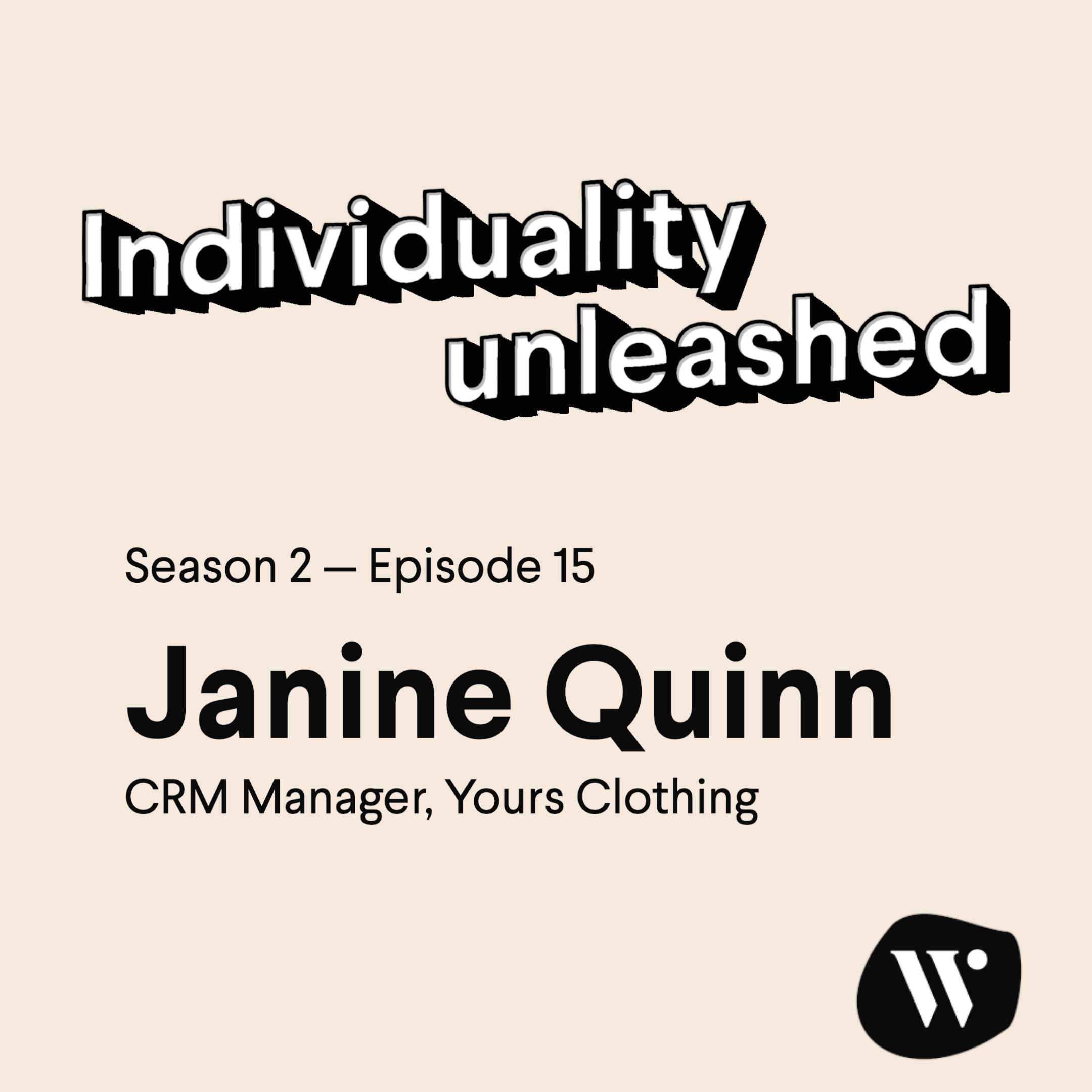How Martech Companies Are Leveraging AI with Djalal Lougouev, President, Ometria
- 0.5
- 1
- 1.25
- 1.5
- 1.75
- 2
Vern Tremble: Welcome to another episode of Individuality Unleashed. My name is Vern Tremble, senior director of Content and Communications here at Wunderkind. We're going to discuss all things digital, performance marketing and artificial intelligence, and today we are joined by a fantastic guest. His name is Djalal. He is the president of Ometria, and we are super excited to have him here today. Hi, Djalal. How are you?
Djalal Lougouev, President, Ometria: Good, good. Thanks for having me, Vern.
Vern Tremble: Absolutely. I want to make sure, am I pronouncing your name correctly? I'm pretty sure I am, but if not=-
Djalal Lougouev, President, Ometria: Yes. Yes, you are. You're one of the few that pronounced it perfectly, so thank you.
Vern Tremble: No problem. I imagine it's French.
Djalal Lougouev, President, Ometria: Yes, it has French root, it has Arabic roots. It has roots from all over the world and it's unfortunately very hard to pronounce.
Vern Tremble: It is, but I try my best on that. Thank you for that check mark. And in talking a little bit about yourself, I'd love for you to just to tell the crowd a little bit about who you are before we jump into our topic today.
Djalal Lougouev, President, Ometria: Yeah, of course. So I'll keep it relatively short, but I grew up in Switzerland. I moved out to London to start my career. I actually started my career in investment banking in structured commodity finance, which is probably furthest removed from AI and the conversation we have today. And then I met my business partner, Ivan, and we did a whole bunch of different businesses together. And the reason we got into customer data and marketing and artificial intelligence is we used to invest into a lot of different businesses. And one of the key verticals that we're investing into that was about 12, 13 years ago, was specifically around retail brands. And back then D2C was the hot new thing. And we invested in a whole bunch of different businesses, and a lot of those businesses were very successful and others failed. And we started to learn and understand what made the D2C brands very successful. And we quickly found out that the brands that were successful were the ones that were leveraging customer data, predicting behavior and using all that insight and all that data to personalize their marketing campaigns on a one- to- one scale. So that's how we came up with the idea of Ometria, and that's how we started about 10 years ago.
Vern Tremble: I love that. And you know what, I know this isn't what episode is about, but I love the words of wisdom around both success and failure because it was both through your success and your failure that you were able to develop a business model that has led to Ometria, which is now successful for you.
Djalal Lougouev, President, Ometria: Yeah, yeah, exactly. It was a lot of interesting tests and iterations and back and forth and lots of success and failures that we're able to digest to create the product and the offering that we have today.
Vern Tremble: Not that you have success with Ometria, the product is thriving, can you tell us a little bit about your mission and how AI is helping you to achieve that mission?
Djalal Lougouev, President, Ometria: Yeah, so when we started Ometria, we had a very clear purpose, and our purpose was to help retail brands create marketing experiences their customers love. And we knew that the only way to do that was to start with the data and start truly understanding individual behavior, because when we started Ometria about 10 years ago, and as we know today, there's so many different acronyms out there. There are ESPs, CDPs, CCCM, whatever Forest or Gartner report you want to look at. But when we started the Ometria back in the day, your key marketing technology was an email service provider. And just like the name suggests, those technologies were built to send emails to email addresses. They weren't built to send highly personalized messages to customers across all relevant channels. So that was the first point that we wanted to address and that's why we had this very specific purpose. And we also chose retail due to the complexity of the dataset, but also the fact that the data set is so rich, which enabled us to train the algorithms in the way that help marketing teams create those unique experiences. So on the one hand, on the marketing side, you had email service providers that were not built to solve this particular problem. And on the data side, you had very complicated data technologies that required marketing teams to know SQL or whatever other coding language to be able to extract data that was relevant and helpful to them. So combining the two things, we were able to build the very first customer data marketing platform for retail brands. But what's most important, because we only work with retail brands over the last 10 years, I think we've collected over 30 billion data points that anonymized across all of our customers, which enable us to train our algorithms. And that's how we recently were able to provide more and more insights to our customers, leveraging all the AI innovation that's happening within the industry.
Vern Tremble: That's phenomenal. You mentioned the 30 billion data sets, and it's such an important thing to... I just want to hone in on this for just a moment. The last episode we talked with Spencer Sterling, who is our senior director of ML and AI, and he was adamant in suggesting that AI is only as good as your dataset. So one of the things that I think is important to drive home as we are helping to educate marketers around the power and the efficiency of AI and how to choose the right AI, it's understanding that data is key. Do you want to just expand on that for just a moment, Djalal?
Djalal Lougouev, President, Ometria: Yeah, absolutely. I think when the whole AI trend started, and I'm not talking about recently, I'm talking back in the forties and the fifties and the sixties when the first machine beat a human at chess, that's where all the hype started, but I think a limitation back then was hardware. So how do you create a computer that is able to provide recommendations? It was never about the data back then, but now we're in a different era where the challenge is the dataset. So whatever you feed the algorithm, the more likely the output to be accurate. I know now we went through a big data phase where we try to collect as much data as possible, but we're now in a crossroads as it were, where we have so much data, but we don't know what to do with it. And that's why AI and the use of all these new models that are very openly available to brands, to marketers, to engineers, to be able to leverage all that data is absolutely critical. We are going through a bit of a hardware supply and demand issue, and we've seen that specifically with Nvidia and what's happening with semiconductors. But back in the day when this whole thing started, it was very much about how do you create the best possible hardware to leverage artificial intelligence? Now it's mostly about the data and what you feed these algorithms, and that's why it's also we believe very specific or very important to have a specific vertical, a specific niche, because once you have a data, let's say for a retail sector, the more you feed your algorithms that retail data sets, the more accurate and the more precise these algorithms become and the more inside they're able to provide. If you start feeding the algorithms whole bunch of different data across multiple verticals, you might start to create a bias which could be counterproductive to what you're trying to achieve.
Vern Tremble: I hadn't thought about that. That's actually really good and I think something that's really relevant for our cohort of listeners and considering some of the efficiencies and the benefits of using artificial intelligence. Sure, using that data to create segments, create lookalike, understand your audiences, but also making sure that you are in your scale and in driving efficiencies that you're also not creating biases from the data that you're actually gathering. So I imagine that it just takes a lot of skill perhaps, I don't know. I'd love for you to speak on this. What does a marketer to do? How do they actually go about leveraging the data that they have to create efficiencies, creating proper segments to use AI in such a way where it actually benefits their business in their marketing strategy?
Djalal Lougouev, President, Ometria: So I think probably the most important to start off with, and I've seen this quite a lot... I mean, I used to run product back at Ometria, so my day- to- day job was basically speaking to as many retail marketers as I could get in front of, and I spoke to five, 600 different retail marketers. And the biggest challenge, or the first thing the marketers should ask themselves is ultimately what are they trying to solve, right? I've seen a lot of brands, a lot of marketing teams try to retrofit AI to solve a particular problem when reality AI might not be a solution. So what I would start off with is understanding what is the ultimate objective? What is the goal, right? Is it to increase revenue? Is it to improve customer experience to drive long- term revenues? Is it to improve customer lifetime value, repeat rate, first to second time order, latency? So first and foremost, I would start with the problem or the challenge or the opportunity. And once you understand that, you can then of course use the eye across... I would categorize them across three specific groups where I think AI specifically for marketing can help. First one is predictive analytics, just leveraging data and the different information you have in your customers to be able to predict their behavior. Second one is automating any specific workflows, and the third one is some of the things you briefly mentioned is around personalization. So I'd say those are the three key buckets that we see brands today successfully implement and leverage AI with.
Vern Tremble: It's also predictive analytics, automation and personalization, which is great. So when a marketer starts to do their research on partners to work with in order to leverage those three core tenets, what should they be looking for? How do they go about vetting? And the reason why I bring this up, because I've spoken with a ton of marketers that have tried out tools, have signed huge checks, and have been disappointed by the results that they've received from some of the latest AI tools that are revolutionizing the market, which actually aren't. So what should they be looking for? How should they be researching AI tools?
Djalal Lougouev, President, Ometria: Yeah, absolutely. So as we know, finding technologies and solutions specifically for marketers is very difficult. I don't know if you've seen in the MarTech, I don't know, what is it now, the MarTech 10,000, the 10,000 different providers. I remember when we started Ometria, it was about 2000 different providers, or even less. Now it's 10, 000 different marketing solutions out there as we know, so many different acronyms, so many different vendors within the space, and I'm only talking specifically or within the retail marketing space, let alone marketing in general. So what's very difficult for marketing teams is once again, is when they try to start off by finding a vendor and then retrofitting it. So that's probably the first thing I'd look at. The second one is I would look at existing technologies and data sets and the data flow. So what we always recommend is to look at what technologies you're using today and where the biggest gaps in opportunities are. So what we found, and this varies from different region and sector, but what we found is that we went... by" we" I mean, retail brands, have gone through this crazy acquisition piece where they've acquired every single piece of technology out there. They have multiple ESPs, multiple CDPs, multiple automation technologies. So right now they're in a place where they have all of these technologies, but as you've said, they're not leveraging them in the best possible way. And in most cases, sometimes it's not even to do with the technology, it's to do with internal processes and teams that you have established as a brand, as an organization. So first is to analyze the technologies that you have, and then when finding the right vendor, once you've understood what the key challenges that you're trying to address is, what I would recommend was identify technology that is able to fit in within your tech stack and be... what's the best way to describe it? Find a vendor that has the least path of resistance into your tech stack, to then ingest the data and start trialing out different things. Of course, if you're coming to the conclusion that some of the key major stacks that you have in your organization are no longer working and you need to replace fully, then that's a whole different proposition. But if you're trying to test different AI technologies, it's very important to identify what you already have within your tech stack, what the data flow is like, and what are some of the key objectives and tests that you'll be running, and then using the right vendor and the right technology to be able to do that.
Vern Tremble: That's great. You know what's so helpful about that? It's a sense of calm, and it provides a sense of calm and understanding and clarity to marketers in a time where it is quite literally a paradigm shift in the way in which we conduct business. Although artificial intelligence has been with us, as you say, from the fifties and sixties, with the arrival of market tools like generative AI, more performative tools, it really has become difficult to understand and glean the power of these tools as it would apply to a marketer's day- to- day work. So helping to provide that information, that insight so marketers can make better, more informed decisions when purchasing AI tools is very impactful. So understanding what's beneficial is great, but I'd also like for you to hit on what marketers should be wary of when it comes to AI.
Djalal Lougouev, President, Ometria: Yes, that's a big topic. So there's a few things, and focusing specifically on marketers I think makes the topic slightly easier to discuss. But I think the first thing that comes to mind is, of course, data privacy, right? No matter what AI solution you're using, a lot of them are using tooling and off the shelf solutions that could share data with third parties. So one understanding is what impact it will have on your data when you start to implement AI tools, but specifically, what does that entail for customer data and how that data is being processed and what you're also doing to enrich the customer data that you already own. So that's probably the first thing that we would look at. The second one, I think, is around creativity, right? And I think a lot of people always take AI as a way to replace jobs or roles or humans depending on what the task is. But I'll always look at it as AI is there to spark creativity, innovation versus replacing anything that a human or a marketer is doing today. I'm not sure if you've been following this, but since all these generative AI tools were out, there's a lot of songs being replicated, a lot of books being written, a lot of even now videos being created. Of course, on the one hand, you look at it and you're like, okay, AI is going to take my job, but on the other hand, and I was reading something very interesting, on the other hand, if you look at it from a different lens and you say, okay, imagine you give these tools to Taylor Swift, for example, and instead of replicating her music, what if Taylor Swift has all these AI tools to be able to create more songs, to be even more creative, to basically create more output of higher quality and more volume, right? So it's effectively bringing the two together versus isolating AI as a single point solution to replace or automate certain tasks. So I think ultimately, when marketing teams are implementing these AI technologies, it's very important for them to have the mindset of not looking at it as a replacement, but looking at it as something that they will work together with to be able to innovate, augment, or automate certain things that they were unable to do before.
Vern Tremble: You're spot on, and that's a word of caution that I often give marketers when I'm having my conversations and consultations, is you cannot replace your team with AI because without the human element, without the insight and the knowledge, and quite honestly, the brain trust of your organization, which rests with your people, you lose that spark of creativity that makes your brand and your product and your voice in the market relevant because you start to sound like anyone and everyone else. For instance, with open AI, you're pulling from the open web, which quite frankly could lead to potential copyright infringement, and I've seen that happen before. What would be more beneficial is being able to pull from your own data. For instance, I work with AI tools in creating content, and oftentimes what we'll do is we'll use our existing data, our existing knowledge graph to develop derivative content based on our existing long form content. But then it goes back to the greater point that you made earlier. It first starts with data, and to your point, Ometria possessing, I believe you said, 30 billion data points, there's no way around that type of deep intrinsic knowledge that Ometria already possesses. So when marketers go to look for partners like Ometria, can you just briefly describe how that relationship looks? How does that unfold when marketers approach you and look for insights to partner with Ometria in helping them achieve their goals?
Djalal Lougouev, President, Ometria: Yeah, and before I jump into that, there's other two things that came to mind about the dangers of AI, specifically on the marketing side. There's probably two other things that I would mention. One is... and I think is what you said is automating too much. So once you start to automate, you lose that personal touch, right? And specifically for retail brands, we know what a great experience looks like, right? And when you go into a physical store and you speak to someone, you have a human conversation that is bespoke, that is unique to you. And I think the risk with a lot of these AI tools for not being properly trained on the right data sets could create a generic feel. So as you said, in five, 10 years, everyone's marketing messages, everyone's outbound messages, whatever you're doing, wherever you're applying AI could look very look and feel very similar. Of course everyone wants to automate a lot of the manual tasks, but there's a danger, there's a risk that you don't do it in the right way and you lose that human touch, that experience a lot of the customers are looking for. So that'll be the one thing. And the second one is a lot of the AI applications today, they lack transparency. So you don't actually know how these things work, and if you don't know how these things work, you don't understand what levers to pull on to fine tune it to make sure that it's applicable to your use cases, or more importantly, applicable to your customer in terms of creating these marketing experiences, because it's very rare if you get a vendor or if you apply an agency or a team, that you would have a true understanding of how these things are being processed, calculated, and then used to create these marketing messages. So I would add those two things to be careful about. One is overly automating everything, specifically the things that you can control, but also making sure that you at least understand the principles and the parameters of how these algorithms work to ensure that you can be ready for the output.
Vern Tremble: Absolutely. No, that's really great, and I'm sure that's insight that I know for a fact that our audience and listeners need, because again, like I said, we are in a paradigm shift, and it's almost as if the rug has been pulled from under us, so to speak, because with any new innovations, with any change, you don't want to lose out on first mover advantage. So I see a lot of marketers rushing to be the first to use these tools, but oftentimes are making major mistakes, throwing away months of strategy and upending it with AI technologies that haven't been fully tested, that don't necessarily align with their KPIs, and often or quite potentially will find themselves in dire straits when they are not necessarily hitting their metrics of success. So this insight is so helpful. So thank you so much for adding that additional color to that. One thing I'd also love for you to add as we wrap up, Djalal, today is where can our listeners and viewers find additional resources, and what additional resources would you recommend they research in making AI decisions for their organizations?
Djalal Lougouev, President, Ometria: Well, there's a very easy and obvious answer. One of them is Chat GPT and Bard, right? You can honestly go and ask them a whole bunch of different questions and the results that you get, if you fine tune the queries, are very impressive. Right? So if you're looking to get a better understanding of everything that we've discussed, starting with Chat GPT and Bard would be very helpful. That's on the generic level, right? That's good to get an understanding of top level context. We of course, have a lot of collateral that helps brands get a better understanding of how they can leverage customer data. We've actually released a CDXP buyers guide, so actually answering the question that you had earlier, how one would go about choosing the right vendor, the right provider, what to look at. So we've just recently released a CDXP buyers guide, so highly recommend brands that are about to launch an RFP process. We're thinking about replacing technologies. Take a look at that. Of course, Gartner and Forster are good sources, and of course you guys have great content as well. So looking at different vendors that you're interested in looking at, analysts, Gartner and Forster, McKinsey, Bain have a lot of different research papers on that, and of course using Chat GPT and Bard for very specific questions just to get a top level understanding of how things are working.
Vern Tremble: Those are absolutely great recommendations, Djalal. Thank you so much for sharing those. Those are in fact resources and tools that I use today to do my research. I'm a little biased because as you said, we produce content here at Wunderkind that helps marketers and brands, specifically with an e- commerce and retail. And we recently released a white paper entitled Revolutionizing Retail: How to Navigate the AI Landscape to Drive Performance. So it has all the things that you need to know around leveraging AI to help drive performance for your organization. So if you'd like to learn more about that resource, visit our website at Wunderkind.co, click on resources and you will find that as our latest white paper. But Djalal, do you have any other key takeaways that you'd like to leave our folks with before we adjourn today?
Djalal Lougouev, President, Ometria: I'll leave it with an interesting anecdote that I picked up on another podcast, the Anderson Horowitz podcast, is that it framed my perspective on what we're going through, this paradigm shift. And a lot of people look at AI as this technology, as this conversational chatbot that you have somewhere in the background, as this machine. And the way that they've looked at it and said for a second, if you take a step back and imagine that you've discovered a new continent, right? There's a new continent in this world that you've discovered and everyone in that continent is extremely friendly and they'll do whatever you ask them to do just for a bit of electricity. And now that I'm using chat GPT, I'm like, this is actually a very friendly individual on the other end, and I'm asking them all these questions and they're replying it without asking anything in return, which is an incredible experience that is unlike any other. So sometimes, rather than treating it as this bot on your screen, think of it as if you're conversing with someone that you've never had this type of experience, relationship before. And I thought that was a very interesting perspective or a new lens to look at how we should be interacting with AI going forward, because once you flip the equation, the questions and the conversations that you have becomes a lot more interesting.
Vern Tremble: That's really profound. I love that, Djalal. In fact, I don't know, I might be crazy, but I actually say please and thank you to Chat GP inaudible ask me a question. I don't know. I don't know. Maybe in 10 years it might become sentient and I might curry some favor because I was...
Djalal Lougouev, President, Ometria: We shouldn't lose our human values and principles no matter who we speak to. I think that's the most important thing.
Vern Tremble: Golden rules to live by. Djalal, thank you so much for joining us today. It's an absolute pleasure. We hope to have you back on the podcast sometime in the near future. How does that sound?
Djalal Lougouev, President, Ometria: Perfect. Thanks a lot, Vern, to the team. Thanks for having me and would love to be back.
Vern Tremble: Awesome. Thank you so much for joining us again today. Again, that's another episode of Individuality Unleashed.
DESCRIPTION
Djalal Lougouev, President & Co-Founder of Ometria, joins us in this episode of Individuality Unleashed. We talk through how Ometria, one of our CDXP partners is currently leveraging AI in their business. We then shift the focus to how brands and marketers should approach using AI in for themselves.
Today's Host

Vern Tremble

Richard Jones
Today's Guests






